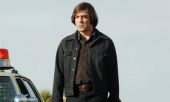 I’m doing an awful job of finding time to blog: hopefully later today I’ll have something more substantial to share with you all. It’s not for lack of thoughts or lack of material, that’s for sure: there is much to be discussed, as Stephen is doing a superb job of demonstrating, and I’ll hopefully get to some of that throughout this week and beyond.
I’m doing an awful job of finding time to blog: hopefully later today I’ll have something more substantial to share with you all. It’s not for lack of thoughts or lack of material, that’s for sure: there is much to be discussed, as Stephen is doing a superb job of demonstrating, and I’ll hopefully get to some of that throughout this week and beyond.
My review of No Country For Old Men seems incomplete now that I’ve gone to see it again. It’s so much better the second time around. And the soundtrack is the real star for me. Carter Burwell was in charge of that department, and it is so subtle and so brilliant, that I thought it worthy of another mention. There’s a minimalist score, made up of sustained tones and little else, and great sound effects. The score over the end credits, too, is simply wonderful, and Burwell seems to have balanced the feel of this film perfectly in the medium of sound.
Here’s what Burwell has to say about the soundtrack of this film:
“The film is the quietest I’ve worked on. Often there is no sound but wind and boots on hard caliche or stocking feet on concrete. Then sporadically there are shootouts involving an unknown number of shooters with shotguns and automatic weapons. It was unclear for a while what kind of score could possibly accompany this film without intruding on this raw quiet. I spoke with the Coens about either an all-percussion score or a melange of sustained tones which would blend in with the sound effects – seemingly emanating from the landscape. We went with the tones.”
The all-percussion score sounds like fun, and I look forward to doing it some day, but it is a cliche to have drums accompany “action” and this sound immediately pulled the film back into familiar territory. The sustained tones, however, kept the film unsettled. Skip Lievsay, the sound editor, and I spoke early about these approaches and he sent me some examples of processed sound effects just as I sent him examples of tone compositions, mostly sine and sawtooth waves and singing bowls. The effect is that the music comes out of and sinks back into the sound effects in a hopefully subliminal manner.
“The end titles of the film raised an interesting question: the entire film takes place without songs or identifiable score, so what could play over five minutes of end titles that wouldn’t be pretentiously self-conscious (like silence or wind) or intrusive (like a pop song)? I ended up writing a tune that features the only acoustic instruments in the score, but they take quite a while to appear. The first sounds are percussion masquerading as sound effects. The next sounds are the sustained tones which are featured in the rest of the score. Only after two minutes of this do truly familiar instruments arrive – guitar and bass – which then play to the end along with the percussion. Hopefully this somehow works with the rest of the film, at least for the few people who sit through end titles.”
Subliminal indeed. I can barely remember hearing any score. Yet, I certainly felt it, especially the second time around; it intensified the suspense and made a bed on which to rest the sounds of gunpowder and metal and glass. I can only hope that there will be an HD-DVD release with Dolby TrueHD sound – “bit for bit identical to the studio master”. It’s already working its way up my favourites list; that might seal the deal.

